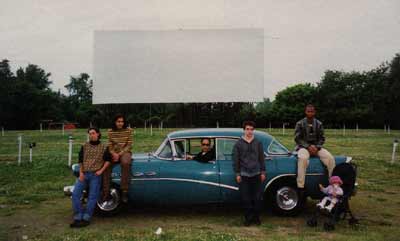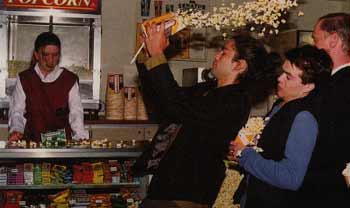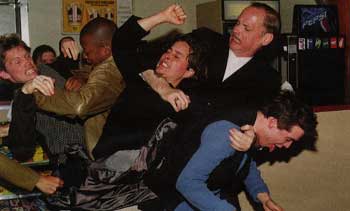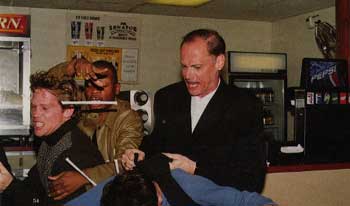|
|
| NEW YORK
TIMES MAGAZINE - STYLE Baltimore Babylon The director John Waters, maestro of bad taste, revisits the dream palaces of his youth By BOB MORRIS |
 "Nothing
bad ever happens at the movies," says John Waters, whose sardonic smile
is bracketed by his pencil-thin mustache. "That's why you go." You don't
have to think beyond "Patch Adams" or "Eyes Wide Shut" to question his credulity.
And while good things often happen to people at the movies, from first kisses
to healing laughter, bad things happen, too. John Dillinger got nailed by
the F.B.I. while leaving a gangster movie in Chicago. Frank Sinatra had
his clothes ripped off by young fans at the Paramount Theater in Brooklyn.
When the song "Rock Around the Clock" started playing during "Blackboard
Jungle," teenagers all over got so riled up that the police were called
in. Lee Harvey Oswald went to the movies to hide after John F. Kennedy's
assasination in Dallas. Patty Hearst first met the terrorist Kathy Soliah
at an Oakland drive-in theater. Gang violence broke out in 1979 at Walter
Hill's "Warriors," and 12 years later, there was a shooting incident at
a screening of "New Jack City" in Brooklyn. And who can forget Paul Rubens,
aka Pee-wee Herman, and his big adventure in a porn theater in Florida? "Nothing
bad ever happens at the movies," says John Waters, whose sardonic smile
is bracketed by his pencil-thin mustache. "That's why you go." You don't
have to think beyond "Patch Adams" or "Eyes Wide Shut" to question his credulity.
And while good things often happen to people at the movies, from first kisses
to healing laughter, bad things happen, too. John Dillinger got nailed by
the F.B.I. while leaving a gangster movie in Chicago. Frank Sinatra had
his clothes ripped off by young fans at the Paramount Theater in Brooklyn.
When the song "Rock Around the Clock" started playing during "Blackboard
Jungle," teenagers all over got so riled up that the police were called
in. Lee Harvey Oswald went to the movies to hide after John F. Kennedy's
assasination in Dallas. Patty Hearst first met the terrorist Kathy Soliah
at an Oakland drive-in theater. Gang violence broke out in 1979 at Walter
Hill's "Warriors," and 12 years later, there was a shooting incident at
a screening of "New Jack City" in Brooklyn. And who can forget Paul Rubens,
aka Pee-wee Herman, and his big adventure in a porn theater in Florida?
 In
his latest movie, "Cecil B. DeMented," bad boy Waters has put every bad
thing that could ever happen in a movie theater into one fun-filled feature.
A kind of "Poseidon Adventure" for cinemaphiles, it is packed with so much
violence and hysteria that it may cause motion-picture sickness. Stephen
Dorff plays a fascistic guerrilla filmmaker and cult leader who wants the
world to suffer for cinema. Melanie Griffith is the starlet he takes hostage
at a premiere. He doesn't make her rob a bank in a beret, but he does make
her his leading lady against her will. In
his latest movie, "Cecil B. DeMented," bad boy Waters has put every bad
thing that could ever happen in a movie theater into one fun-filled feature.
A kind of "Poseidon Adventure" for cinemaphiles, it is packed with so much
violence and hysteria that it may cause motion-picture sickness. Stephen
Dorff plays a fascistic guerrilla filmmaker and cult leader who wants the
world to suffer for cinema. Melanie Griffith is the starlet he takes hostage
at a premiere. He doesn't make her rob a bank in a beret, but he does make
her his leading lady against her will. In the movie, Hearst plays the concerned mom of a young cult member. "I'd be lying if I said that her case had no influence on the script," Waters says of his friend. "But this movie was inspired by every cult I was ever obsessed with." Including the cult of Pasolini, of course.  Using his actors as models, Waters based the photos [seen here] on his own real-life experiences in the movie houses of his native Baltimore. "The rats at the Hippodrome added something special to the horror movies I saw there when I was young," he says. "But eventually we got used to them." At Carlins Drive-In in the mid-1960's, Waters (who used to sneak in via car trunks) got arrested for under-age drinking with a racially mixed group of straight and gay friends. "The cop said to me, 'This isn't Greenwich Village, you know,"' he says. In the 1970's, he watched Dionne Warwick step out of a limousine for the Baltimore premiere of a forgettable blaxploitation movie. "Some local walked right over to her and said, 'Hey Dionne, give me a dollar -- you can afford it."' |
  |
 Other
recollections? "The Apex, an old porn theater. It's so dark in there that
guys come in and sit in your lap by accident." Other
recollections? "The Apex, an old porn theater. It's so dark in there that
guys come in and sit in your lap by accident." Of course, Waters himself hasn't done much to make the movies safe for audiences. During the original run of "Pink Flamingos," some theater personnel had to throw sawdust on the floor to cover the vomit, which Waters likened to receiving a standing ovation. And when "Flamingos" was rereleased in the late 1990's, multiplex audiences had to put up with hearing Divine bellowing through the walls: "Somebody sent me a bowel movement!" Then there was "Polyester" in Odorama, with the infamous "scratch and sniff" cards on which audiences were invited to inhale the smell of flatulence, among other things. "It was one of the highlights of my career," Waters observes. Despite all evidence to the contrary, the director was brought up in a traditional Baltimore home, where manners were important. "You have to know the rules," he says, "in order to know how to break them stylishly." 
He still holds to the rule that wearing white shoes after Labor Day is not appropriate, as Patty Hearst found out when she was savagely attacked in "Serial Mom." What is appropriate -- even at Waters's age, 54 -- is throwing candy at snoring old men in theaters. "I recommend Good and Plenty right in the head," he says. And for premieres, he suggests the color black for all directors. "It makes you look severe and beyond the reach of critics." Not to mention those recently awakened old men. |